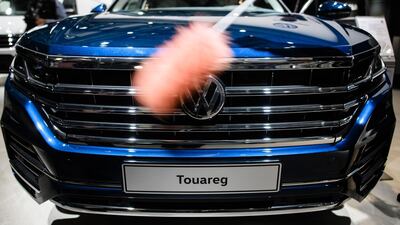Germany may be the biggest likely victim of any punitive US tariffs on car imports, but the industry’s complex geography means other European countries would also be hurt – and in relative terms, some may take an even bigger hit.
Two of them, Italy and Hungary, are run by populist governments with leaders well-disposed toward US President Donald Trump.
Eight of the top 15 countries that export cars to the US are European. Asked to name them, most Americans would probably mention Germany, Italy, the UK and Sweden – each of them home to popular car brands. It’s not well known Fiat Chrysler Automobiles’ Jeep Renegade, one of its best-sellers in the US, is made in Melfi, Italy. It will surprise many, too, that Slovakia, Hungary and Finland are among the top exporters, selling more than $1 billion of cars a year each.
Few in the US have ever heard of a Slovak car - but Volkswagen, Slovakia’s biggest private sector employee, produces Touareg 4x4s, Audi Q7s and Porsche Cayennes for the US market in Bratislava. Daimler and VW brand Audi have large factories in Hungary, while Finland’s Valmet Automotive is a big contract manufacturer for Daimler.
That, however, is only the most visible part of European countries’ automotive exports to the US; central and eastern European nations are deeply integrated into international production chains, especially those of German manufacturers. In Hungary and Poland, components - body and chassis parts, and in Hungary also engines – account for a greater share of automotive exports than complete vehicles. Austria and the Czech Republic are also notable component exporters.
Last year, Robert Stehrer, a trade economist at the Vienna Institute for International Economic Studies, calculated that the direct and indirect value added due to car exports to the US amounted to between 0.5 per cent and 0.9 per cent of economic output in Hungary, Slovakia, the Czech Republic and Austria.
But that can hardly be a precise calculation because not enough data are available about the constantly changing state of the automotive industry’s value chains. Even in complete vehicle production, Finland turned into a major exporter to the US in just two years thanks to the Valmet-Daimler contract; when it comes to components, the geography of supplies changes as manufacturers’ model lines, procurement and sales strategy shift.
When it comes to the threatened 25 per cent US tariff, it’s not easy to calculate the potential damage to countries that export components to Germany and other countries where “German” cars are made.
If the tariff prompts manufacturers to try and cut costs, eastern European countries might benefit over time. But in the near-term, they would all stand to lose as sales decline. Hungary and Slovakia, with their almost entirely export-oriented automotive industries, would be first in line.
The direct effects of the tariffs on economic output may turn out to be small; after all, demand for luxury cars like those Slovak-made Porsches isn’t particularly price-elastic. But in the highly flexible auto industry, job cuts are almost inevitable after any kind of shock to sales. The ripple effect will be noticeable in small countries like Hungary and Slovakia.
Eastern European countries tend now to have a more positive image of the US than those to the west. In Hungary, favourability toward the US has even risen a little, to 63 per cent in 2018 from 62 per cent at the end of the Obama presidency; in Germany, it fell to 30 per cent from 57 per cent.
A US attack on one of these countries’ most lucrative export industries, however, would not be good for America’s popularity. It would also be likely to dampen the enthusiasm shown by the region’s populist leaders for Mr Trump. It’s difficult to imagine them backing the tariff or trying to explain it away; America First, in this case, means direct damage to Hungary First, Slovakia First, or Italy First.
With his tariff threats, Mr Trump isn’t just alienating Germany. He’s sowing the seeds of anti-Americanism where it wasn’t widespread before – in countries grateful to the US for giving them a chance at a better life than they had as Soviet satellites. Undermining the economic growth of which eastern Europeans are proud isn’t a smart policy for the US, however Mr Trump may feel about German cars.
Bloomberg

